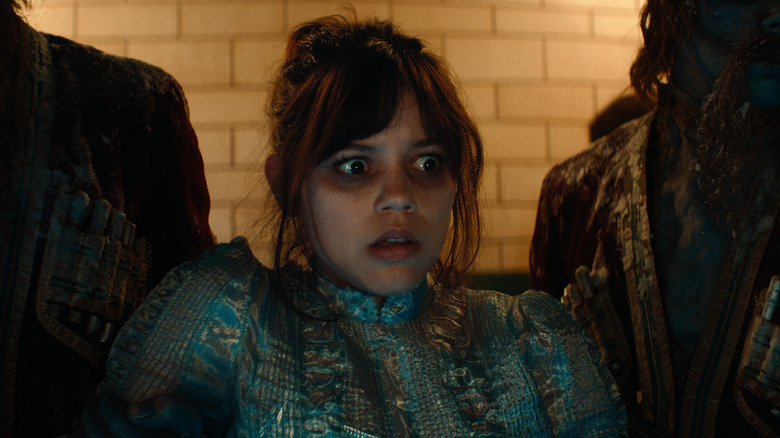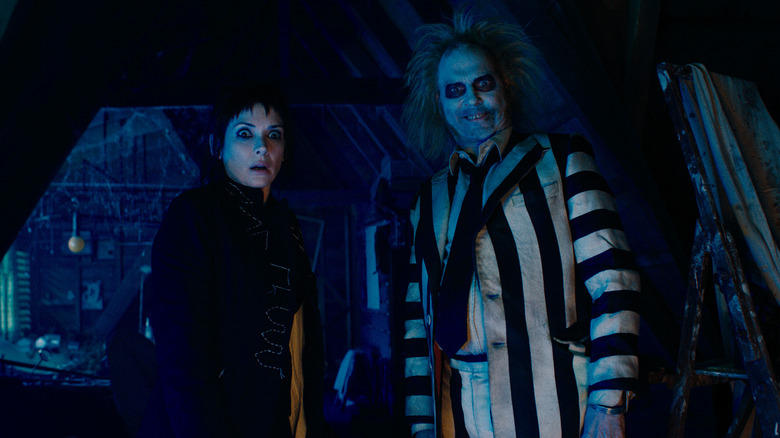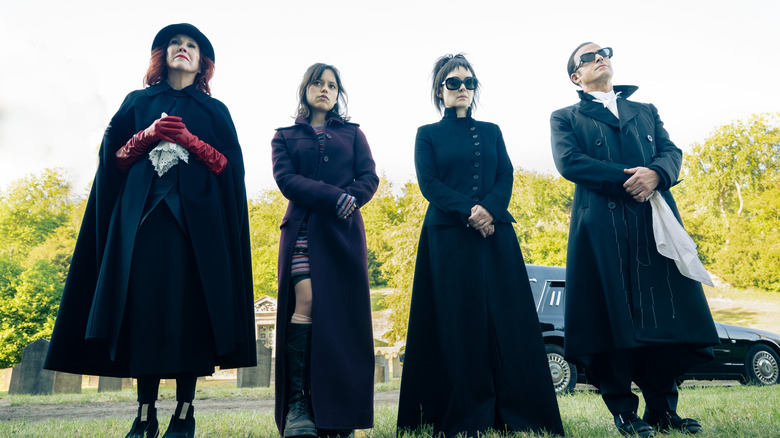Beetlejuice Beetlejuice Review: The Juice Is Loose In This Frenetic But Underwhelming Sequel [Venice 2024]
- Creative world-building of the Afterlife that expands upon the original
- Jenna Ortega is compelling as Astrid, Lydia's daughter
- The characterization of Lydia is pretty depressing
- Beetlejuice is misused
- Too many meandering subplots
Who hasn't been dying for this decomposing little scamp to worm his way back into the land of the living? In "Beetlejuice Beetlejuice," the long-awaited sequel to "Beetlejuice," the Deetz family returns — now with a whole bunch more emotional baggage and the next generation in tow, played by a scowling Jenna Ortega. "Beetlejuice Beetlejuice" succeeds in giving the newest Deetz a compelling story of her own that isn't just a rehash of Lydia's from "Beetlejuice," and delivering some fantastic Afterlife world-building that expands dramatically upon the original. But strangely, the franchise's two most popular characters — Lydia (Winona Ryder) and Beetlejuice himself (Michael Keaton) — are given much less to work with. Their lack of interesting characterization may not sink the film, but it mutes the emotional impact of having the original gang back together.
"Beetlejuice Beetlejuice" takes place around 30 years after the events of the original film, our bright-eyed gothic queen Lydia now a celebrity psychic who uses her ability to communicate with the undead to launch a lucrative career as a medium. When her father Charles dies suddenly (he was played by the problematic Jeffrey Jones in the original film, but "Beetlejuice Beetlejuice" goes to ridiculous and often hilarious lengths to avoid needing to recast him), she and her stepmother Delia (an always delightful Catherine O'Hara) return to their iconic home in Winter River to get his affairs in order. Lydia's teenage daughter Astrid (Jenna Ortega) reluctantly tags along, their relationship hanging by the barest of threads. But little do they know that on the other side of the veil, Beetlejuice has some problems of his own — namely, a murderous ex-wife (Monica Bellucci) and his lingering obsession with Lydia, both of which come to a head in fairly short order.
Jenna Ortega shines, while Lydia and Beetlejuice are poorly utilized
As Astrid, Jenna Ortega gets perhaps the most interesting character arc of the film, as she grieves the loss of her father and grapples with a fractured relationship with her mother, who she considers a fraud. She's not a carbon copy of Lydia — although we can certainly see the personality resemblance between the two — and her main narrative complements the world of "Beetlejuice" and the original film without trying to replicate it. Were Lydia a less popular character, it would be easy to see this being primarily Astrid's story, focusing more on her own grief and burgeoning relationship with Jeremy (Arthur Conti) alongside some Beetlejuice-tinged adventures. But here, the film's creators are in a bind — how can they do right by Lydia and Beetlejuice while still injecting vitality in the form of a new, youthful character who could eventually become one of the faces of the franchise moving forward?
Honestly, they don't do a great job. When we meet Lydia, now middle-aged and having sold out for a career that takes a toll on her mental health and makes a mockery of her paranormal abilities, she's a sad, broken woman. It's hard to understand why the writers thought we would want to see this version of Lydia, but it's kind of a bummer.
Similarly, Beetlejuice is a bit of a letdown. Given that his name is the title of the original film and he's become such a memorable character, audiences sometimes forget that he's really not in that much of "Beetlejuice" compared to Lydia and the Maitlands. In the sequel, we get a lot more of him, but it's somehow much less meaningful — he almost works better as a looming off-screen presence with brief, periodic appearances. Here, we maybe see too much of him. And so much of his screen time is devoted to the bizarre backstory of his ex-wife, the death cult leader, a subplot that goes absolutely nowhere. We kind of don't need any of it? Less is more, especially with an over-the-top chaos agent like Beetlejuice. There's a moment in the film where Lydia finally desperately summons him and he emerges triumphantly from the model town, which feels like it would have been a much more effective re-introduction of the character. Better than watching him work a middle-management job in the Afterlife, at least (no disrespect to Bob, of course, his Goomba-like underling who we would both kill and die for).
Honoring the original while also creating something new
Ultimately, it's the writing that prevents "Beetlejuice Beetlejuice" from living up to the eccentric charms of the original film. There are too many loose ends, too many subplots that aren't resolved to any degree of satisfaction and probably don't need to exist in the first place. You can feel a silent war going on that strangely echoes some of the themes of the film, which reflect a common struggle for long-awaited sequels — how much do you attempt to pay homage to the characters who helped put the original "Beetlejuice" on the map, and when do you decide instead to forge ahead?
"Beetlejuice Beetlejuice" splits the difference, and winds up neglecting both. Still, there's enough here to win over audiences who loved the original film, particularly in its depiction of the endless bureaucracy of the Afterlife, so it's not out of the question that a potential future "Beetlejuice Beetlejuice Beetlejuice" might get the chance to get the balance right next time.
"Beetlejuice Beetlejuice" hits theaters on September 6.


